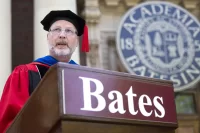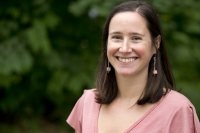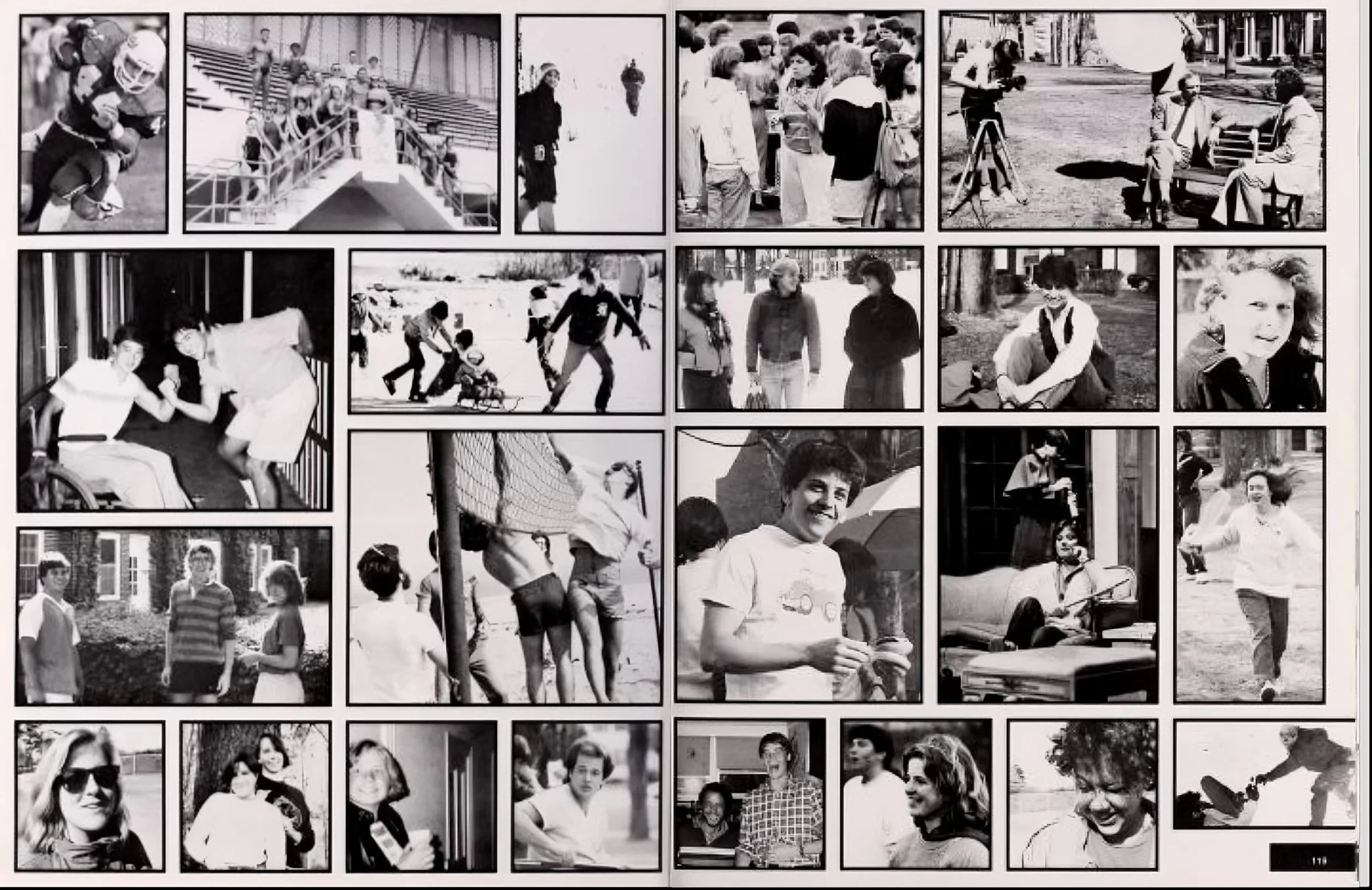
Frequently in his career as a Bates professor and academic dean, Carl Benton Straub, who died Nov. 15, 2019, at age 83, delivered remarks specially crafted for Bates celebrations, both large and small.
Erudite and eloquent, he imparted meaning and insight through well-researched metaphors, historical comparisons, and scholarly references to honor people, places, and institutional moments.
Here are six examples, including a final and more personal text about his last faculty office.
- Thoughts on his college dictionary (2004)
- An Appreciation of Robert Feintuch (2013)
- Advice to seniors at the 1988 Senior-Faculty Dinner (1988)
- Honorary degree citation for Jimmy Carter (1985)
- Reflections on Peter John Gomes (2012)
- “I Saw My Office Passing By” (2014)
Thoughts on his college dictionary
Straub wrote this text for Bates Magazine in 2004 for a story about favorite items in faculty offices, later calling it “an appropriate reminder of the power of words and hence the privilege of speech.”
Voltaire and Ambrose Bierce wrote dictionaries; I merely use them. This one, which I bought my first day in college nearly 50 years ago (I remember the purchase in the Colgate bookstore), has been on my desks almost every day since.
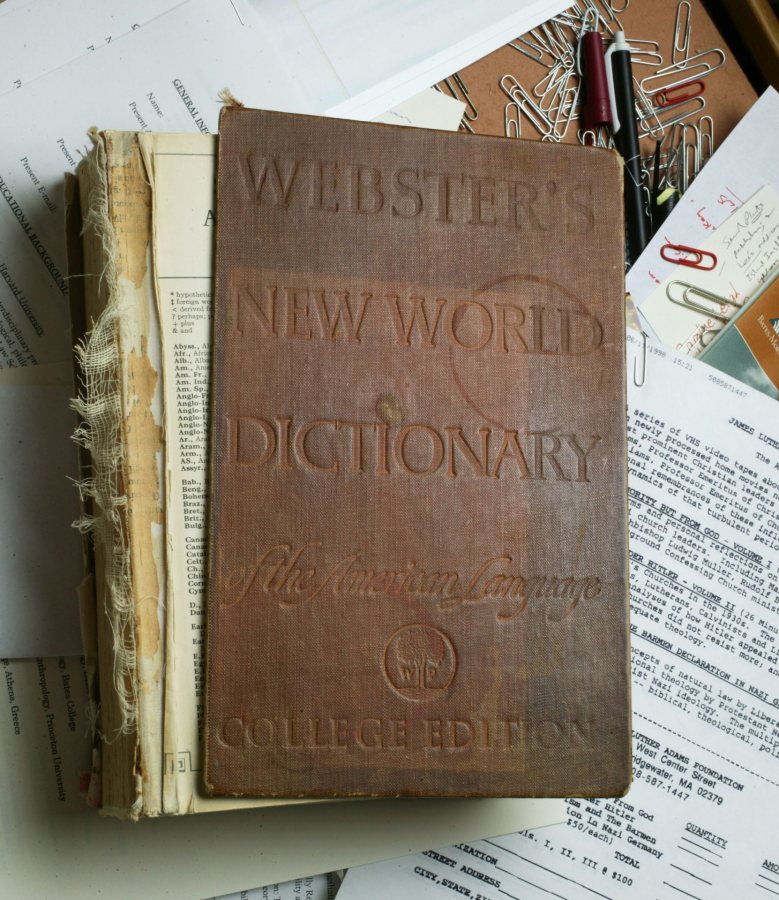
Carl Straub’s dictionary, purchased on his first day as a Colgate undergraduate. (Phyllis Graber Jensen/Bates College)
It has been my silent companion. It has yielded up secrets when I thought I knew it all; it has disciplined me when I was careless. It has reminded me that my own creative powers are strangely limited by our lexical fate. No wonder Bierce called a dictionary (not his!) “a malevolent literary device.”
The book is not about a chapter in my life but rather of a theme on my journey. The theme is awareness that words are dangerous when misused because they have so much power. They put persons and things in their places, constructing situations with which we must struggle.
Words play havoc with our sensate selves, screening us from deep recesses of life, and thus seducing us into fickle and brittle pageants. My dictionary hasn’t saved me from these dangers. But its presence has kept me alert.
An Appreciation of Robert Feintuch
Written in 2013, this appreciation for Robert Feintuch, senior lecturer emeritus in art and visual culture, displays Straub’s love of the arts and deep admiration of his faculty colleagues.
I have known Robert for 37 years, ever since his initial appointment to the faculty of Bates College.
While we may not be close in time spent together, we are close colleagues. I cherish his friendship; I relish his presence. I have three of Robert’s works, two finished in 1974 as well as one of the more recent “cloud series.”
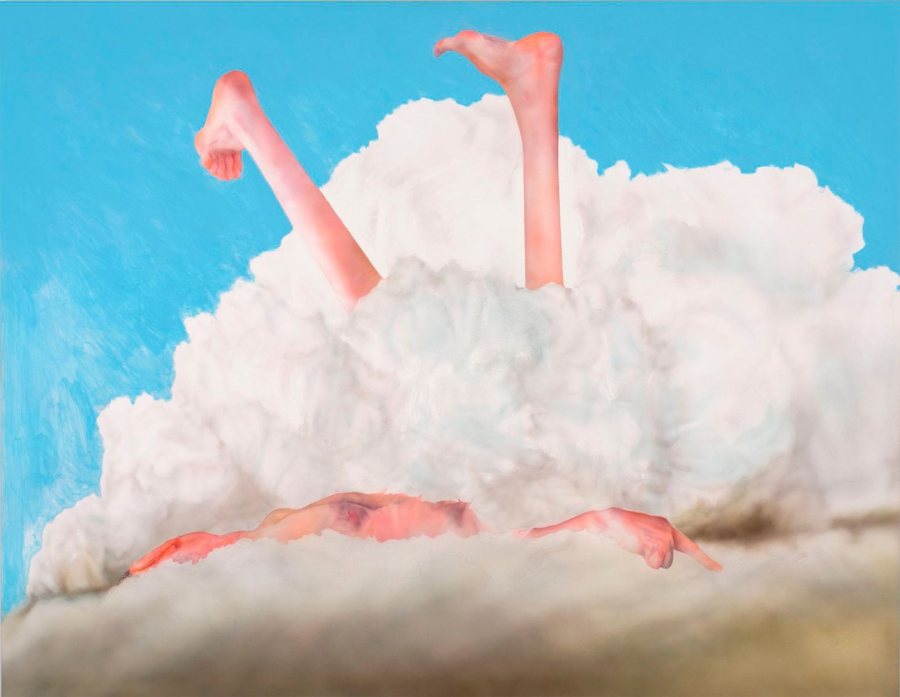
“Legs Up” (2013), a painting from what Carl Straub calls Robert Feintuch’s “cloud series,” in polymer emulsion on honeycomb panel. Courtesy Sonnabend Gallery, New York; Miller Yezerski Gallery; Boston, and the artist.
What are two of the many dimensions of Robert’s life and journey which I most admire? First, I admire his knowledge of the history of Western art and artists, a history which informs his own work and which he uses to judge how he is doing.
He taught me, as no other artist ever has, how vital is the understanding of whence we have come to appreciate well where we are, why we see what we see, and why we celebrate beauty and truths in the forms we do.
Second, I admire his relentless commitment to and his almost flawless skills for teaching undergraduate students. He is a Master Teacher, surely a noble profession which, when joined with his art, makes him an earthen treasure lighting up our lives.
Happy birthday, dear Robert.
Advice to seniors at the 1988 Senior-Faculty Dinner
In 1988, Straub was dean of the faculty when he offered these remarks, directed at the graduating seniors, to conclude the traditional Senior-Faculty Dinner.
I want to make brief concluding remarks. They are expressions of my personal wishes for you who soon will leave this place.
I know that when you first came to college, all of you had your own high expectations of what would happen in your lives. I’m sure that one of these nights before Commencement your memory will flash back to those expectations. Some of you probably thought that college would solve all your problems. I’m sure it hasn’t done so.
You probably thought ambiguities would be overcome. Instead, I’m sure new ones have arisen. I do hope, however, that during your years here you have received three gifts, and that you will always bear these gifts and share them with others.
First, I hope you will be forever curious about the facts and truths of life. Learning helps awaken us to our enworlded condition. Knowledge begins in the astonishment that things are the way they are. Curiosity about the world around us and within us needs to share a place with curiosity about the past.
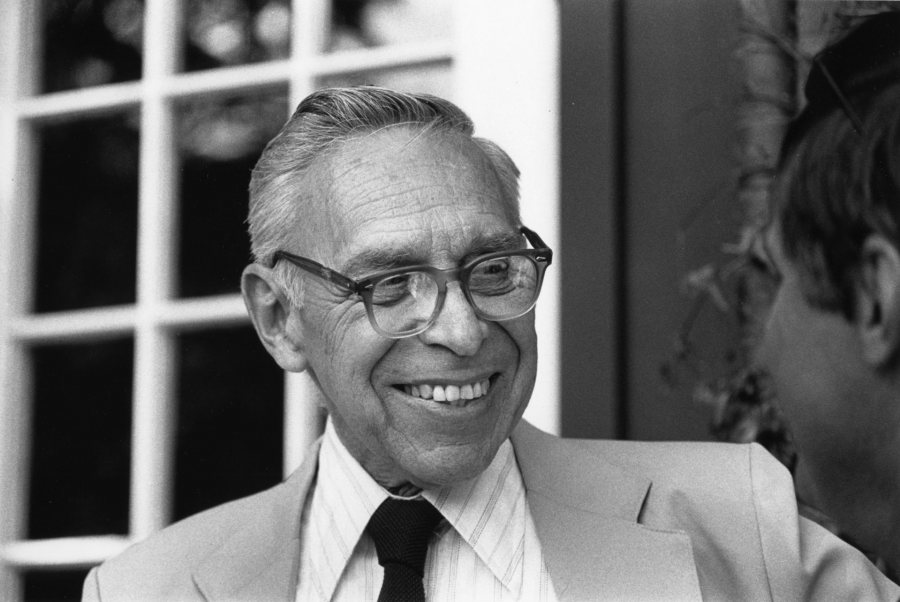
In his 1988 Senior-Faculty remarks, Carl Straub bade farewell to retiring professors, including Professor of History Ernest Muller, seen a few weeks later at Reunion. (Muskie Archives and Special Collections Library)
History is like a river. On the surface, it flows rapidly and disappears. But down below, there is a deep stream which moves more slowly, doesn’t change quickly, but is the more important because it drives the whole river. Be curious about the deep-down stream. Be proud of your curiosity.
Second, I hope you will do a little civil thinking each day. We all need to reflect upon the responsibilities of citizenship. Democracy is not a spectator sport. The easiest thing in the world is to “cop” out of the politics of power. The results can be disastrous. Our civic life needs courageous and imaginative participation by you.
I hope you who are leaving and we who are staying will live in touch with the depth of life rather than on the surface of adversarial relationships.
Third, I hope you understand and will remember the ancient meditation sounded through all generations: “Either we love one another, or the sea will engulf us and the lights will go out.” The educated person, it seems to me, has insight into the nature of human solidarity. The educated person appreciates the deepest yearning of humankind, the yearning for reconciliation and for trust.
I hope you who are leaving and we who are staying will live in touch with the depth of life rather than on the surface of adversarial relationships. That is one way to act out the privilege of being educated persons.
Members of the graduating class, I am certain all my colleagues on the faculty join me in extending to you hearty congratulations. What we wish for you is an adventure in the life of the mind, well-salted with wit and fruitful diversion, and full of surprises and discoveries about your own possibilities. Dig deep into your worlds. You will find abundant treasures.
To our honored teachers and colleagues who are retiring, we thank you most heartily. Professor Chances, Professor Gyi, Professor Hepburn, Professor Muller, Mrs. Dudman: They have been our mentors for integrity.
There is an old Russian saying, “A word is not a sparrow. Once it flies, you cannot catch it.” As teachers, your words will remain among us, while they continue to go out from this place, in sovereign flight. They will continue to beckon us toward what you have professed. To everyone here: good night.
Honorary degree citation for Jimmy Carter
In September 1985, Jimmy Carter traveled to Bates to honor his former secretary of state, Edmund Muskie ’36, at the dedication of the Edmund S. Muskie Archives. Carter received an honorary degree during his visit, and Carl Straub wrote this citation, as he did for 111 honorands as dean of the faculty from 1974 to 1991.
President Reynolds, I am honored to present Jimmy Carter.
There is more than the Appalachian Trail which binds Maine to Georgia. There is a common heritage which rises from the simple decency of our people: we share a sense of what is good and just and beautiful. Therefore we share gratitude for the common leadership given us by Jimmy Carter. On this festive occasion when we honor a son of Maine and of Bates, we pause to thank this son of Georgia.
His journey has been one of human adventure.
Jimmy Carter was Georgia’s 76th governor and America’s 39th president. His personal sojourn and public record are common knowledge: farmer and businessman, naval officer and nuclear engineer, public educator and church teacher, political leader and planning commissioner, house builder and fly fisherman.
His journey has been one of human adventure. When he reached his highest office, he did not forget the lessons from that journey, for they taught him what is important to the American people.
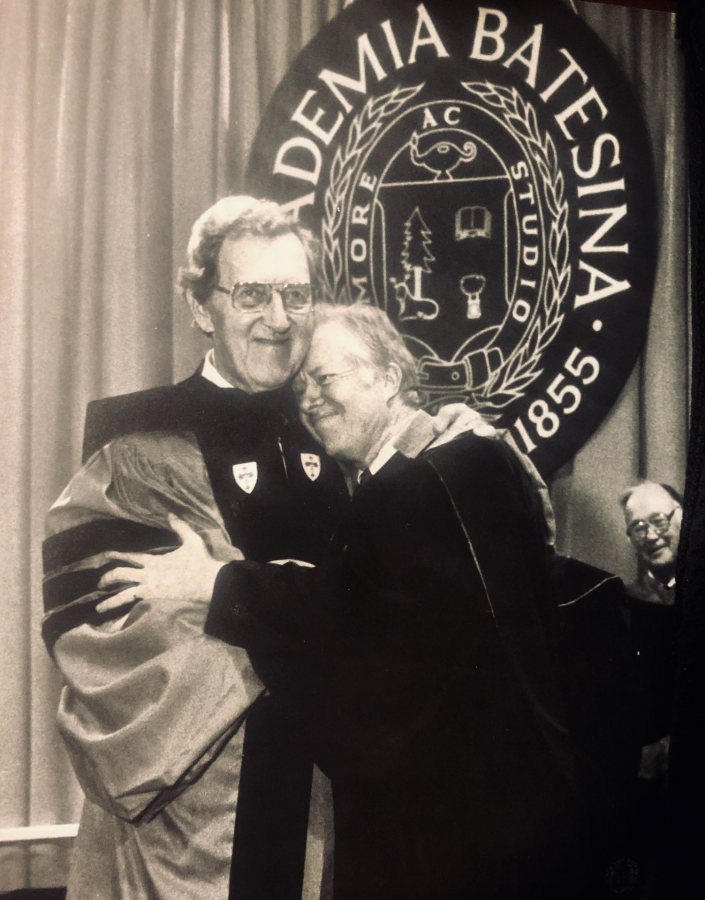
Former President Jimmy Carter hugs Edmund Muskie ’36 during ceremonies dedicating the Muskie Archives at Bates College on Sept. 28, 1985. Muskie served under Carter as U.S. secretary of state. (Frank Siteman)
And so his presidency was marked by firm commitment to human rights throughout the world. It was marked by foresight to protect our natural environments, to preserve American wilderness. It was marked by courage to negotiate, with Panama, with Egypt and Israel, with China, with the Soviet Union.
For his grace in the use of power to bear down the haughty and lift up the downtrodden, and for his quiet example that wisdom and love bring reconciliation on this globe given to light and shadow, I present Jimmy Carter for the degree Doctor of Laws.
Reflections on Peter John Gomes
On Oct. 25, 2012, Straub spoke at the renaming of the Bates Chapel in memory of the Rev. Peter Gomes ’65.
The young John Keats is remembered by his own words, “Here lies one whose name was writ in water.” Today we gather to write Peter’s name in stone. The walls which frame us, the turrets which anchor our conclave, quarried near Hingham, Mass., a century ago, give place for our remembering and for Peter’s name.
It is right that we do so. In a Feb. 4, 1977, letter to the venerable dean Harry Rowe, Class of 1912, Peter wrote, “Hardly a day goes by when I do not have reason to bless the God of Heaven for my years at Bates.” Peter never wavered in his gratitude.
From his early years, Peter was smitten with words. Over time he became their connoisseur.
He relished this college. He cherished this chapel. Much of his undergraduate life was woven into this place. He sang in the choir and at times was choirmaster. He played the organ. In his senior year he helped liberate chapel services from a century of mandated student attendance.
As student and alumnus, he preached and lectured here for nearly half a century. In the last return he climbed haltingly up to this pulpit. For Peter, the college chapel was where, to borrow Wendell Berry’s fine words, “all is unentangled and all is undismayed.”
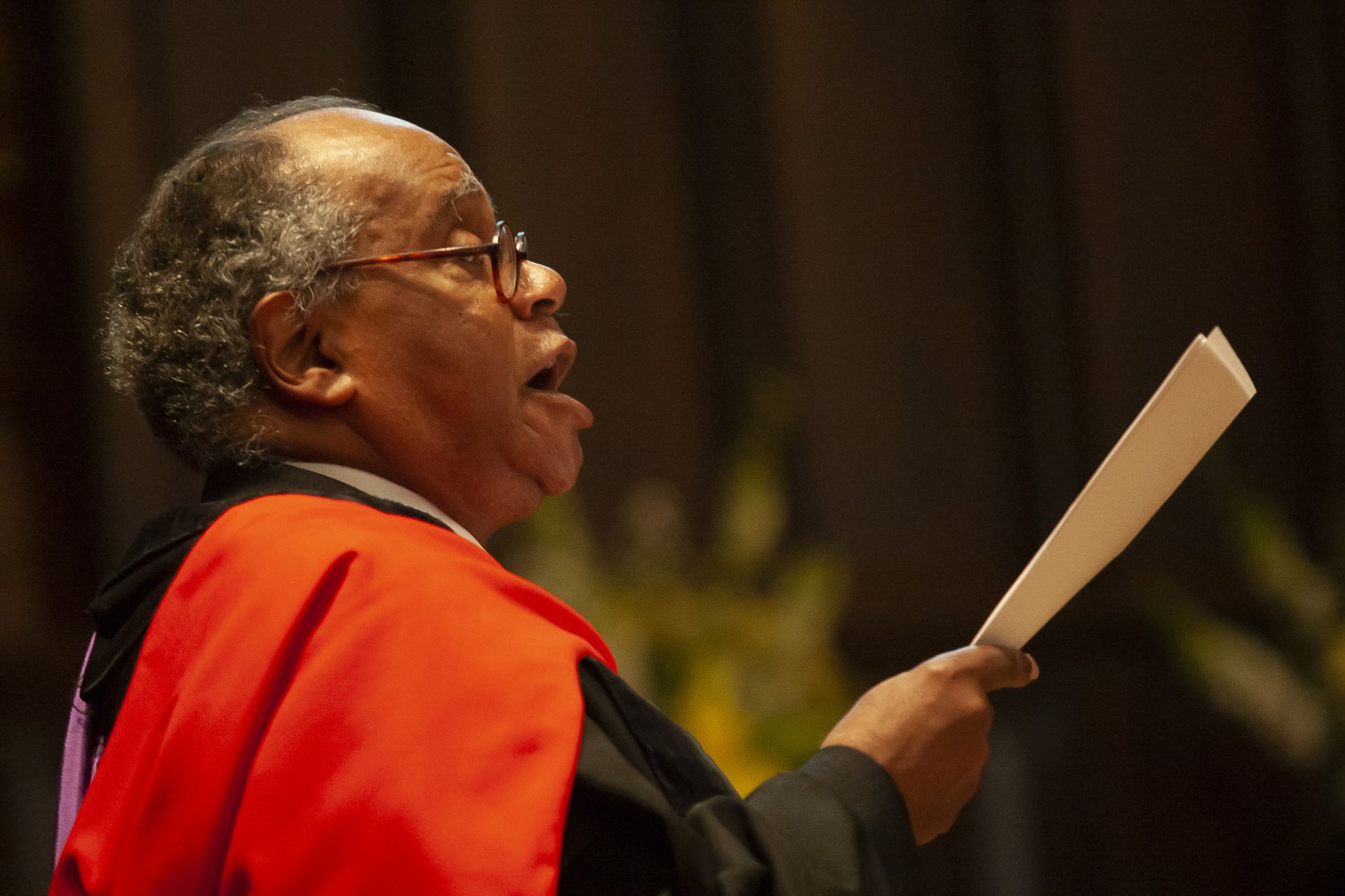
The Rev. Peter Gomes ’65 sings during the Alumni Memorial Service at Reunion 2010. (Phyllis Graber Jensen/Bates College)
What simple stories can I tell about our complex friend that might expand the narrative of continuity in his life? Three come to mind; two are his own.
Peter tells of a conversation with Benjamin Elijah Mays, Class of 1920. The then-elderly statesman said, “As a boy I preached to the crows and the cows. But the best of speaking I learned at Bates.” Peter replied, “I did too, sir.”
From his early years, Peter was smitten with words. Over time he became their connoisseur. He respected their power to break the silence, sometimes for the good. Throughout his life he practiced their magical syllables. Peter acknowledged that at Bates good speech depended on overcoming the facile thinking and faulty logic of youth.
He attributed his rhetorical confidence and agility to the craggy Yankee professor of speech Brooks Quimby. Peter met Quimby in his first week of college classes and always called him his “spiritual mentor.”
Peter said that these early experiences provided him with “a certain measure of moral security” for the later challenges.
A second story is also Peter’s. Toward the end of his study here the administration proposed a radical change in the academic calendar. Faculty and students were strongly opposed. As was the custom, a debate was scheduled to clarify the issues. In what he called a moment of “perversity,” Peter chose to enter the debate and argue for the change. Well, the judges ruled Peter’s side had — won.
He later recalled the event: “I chose to take the losing side in popular opinion, and won. That appealed to me almost more than anything else.” At Bates and during two years at Tuskegee, he often advocated unpopular alternatives in campus controversies — and prevailed. Peter said that these early experiences provided him with “a certain measure of moral security” for the later challenges.
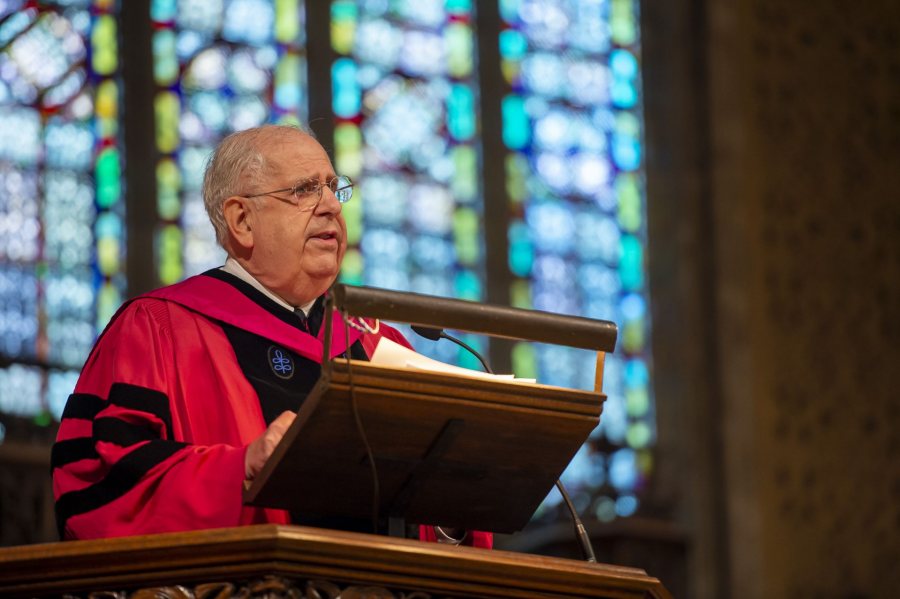
Carl Straub speaks during the service for naming the Peter J. Gomes Chapel on Oct. 25, 2012. (Mike Bradley/Bates College)
Finally, a story of collected moments. In a 1987 Bates interview, the Plummer Professor acknowledged that while he was not “a rank heathen” in college, he shared “the cynicism of an undergraduate who had disproved the existence of God.” Irreverence joined his mischief. When employed as Sunday organist for a local Episcopal church, Peter liked to play as preludes rather snappy renditions of “Lady of Spain.”
On his journey, Peter said what he said, did what he did, hoped what he hoped, out of the audacious and confounding freedom of a Christian man.
On campus, he worked to break down remnants of an earlier residential culture intended for piety. As president of the campus-wide service organization, he single-handedly changed its long-held name “Christian Association” to “Campus Association.” While Peter was partisan of institutional origins, he also had hearty — and targeted — disdain for what he once called, during his trustee years, “sunshine traditions.”
On his journey, Peter said what he said, did what he did, hoped what he hoped, out of the audacious and confounding freedom of a Christian man. But the pilgrimage itself, the circumstances of living, disciplined his faith and toughened his fortitude. The gift of freedom came to bestow the duty of caring for his fellows.
I return to stone and water. Today we are drawn to stone, not water, to mediate our memories, to mark our gratitude, to chisel into permanence the transitoriness of our kind. The slave spiritual insists there is always, always one more river to cross; we have chosen stone in effort to bridge the flow.
Lest we forget, however, in the midst of our celebration: Keats, the arts and the sciences, render tentative our choice. For Yeats, who read here 80 years ago, the waves may wash away even the stars. The poet Elizabeth Bishop notes water as the transmutation of fire which feeds on stone. The lineaments of Delphi are burning.
In the time beyond our histories, then, the templed rock of Plymouth may crack into the incorrigible sea. The brick may be carried down the Charles to join sediment in the harbor. These walls may be broken by rain and tumble through the rapids to Merrymeeting Bay.
Peter knew all this. He knew of the firmament and of the flood. But in his generous mischievousness, he would have allowed us this day, and he would have joined in our song. So let us rejoice within and because of the bounty of our lives. Let us rejoice and be exceedingly glad for dear Peter’s life — for his life among us, for his life in this place.
Amen.
“I Saw My Office Passing By”
This is a different kind of writing, one displaying his sardonic wit — this time in service of a poignant theme. Straub wrote this reflection in August 2014 during the demolition of his final office, located at 75 Campus Ave., razed to make way for two new residence halls.
The other day my car was stopped while a large truck came out from the crushed space behind the shabby screens trying to announce “progress” for the neighborhood. At first I was mildly annoyed. But soon I recognized it was my office passing by. It was not easily recognizable.
After all, I left it nine years ago, chased out by a policy which states, “retire, vacate.” Nothing organic about departments; it’s all a matter of contracts. Nothing lingering about high learning; the end of sharing is quick and efficient.
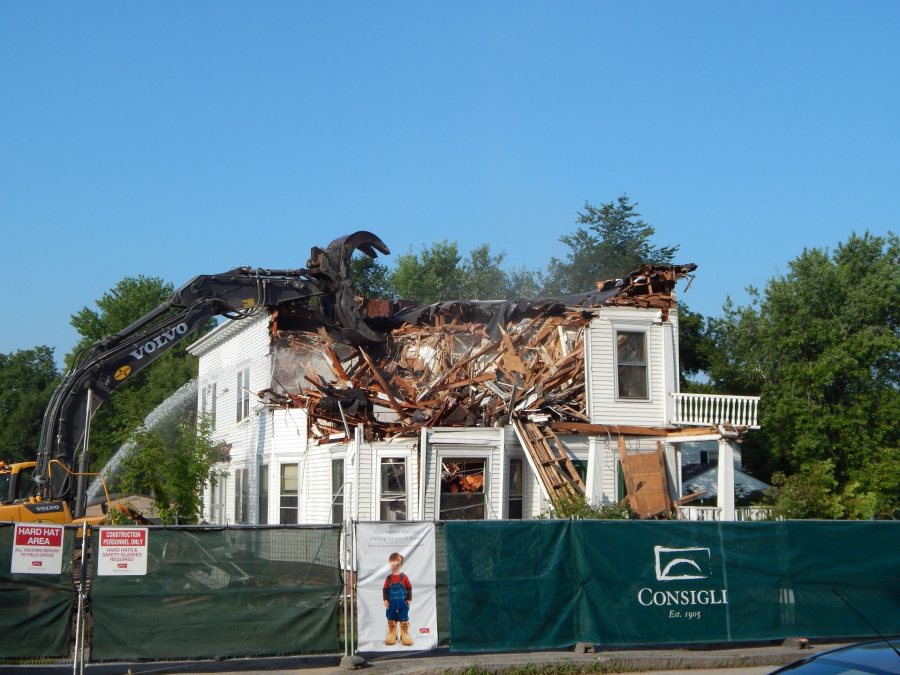
Carl Straub saw symbolism in the razing of the building at 75 Campus Ave., where he had his last office as a member of the religion faculty, in August 2014 to make way for new residence halls. (Doug Hubley/Bates College)
So perhaps I only surmised it was my office. But I was glad I could wait in silence while the truck load rocked over the curb with my friends’ offices also.
It was my last office in the college. It was my seventh. The first was the tiny one to the left of the Parker-side door into Hathorn. There were two more in Hathorn, near dear Joe D’Alfonso. Then there were two on the ground floor of Parker, near Charles Niehaus and John Cole. There was the interlude office on the third floor of Lane. It was in that office that I first encountered a few who became treasured friends.
That happy band in the dilapidated old apartment house all savored their common place.
I remember my last office, the one which I’m certain passes me by, when it was a room in Margaret Brearley’s apartment. Margaret was an assistant professor of German who died early in her career. Alas, I cannot remember the year I moved into the last office. Was it 1991? All I know is that I was happy there. I was surrounded by my favorite colleagues. I was meeting with wonderful and sometimes recalcitrant students in both religious studies and environmental studies, for a magical opportunity.
It was my place where I had moments to reflect on both the college faculty who spoke to me on campus because I left the dean’s office, and those who no longer spoke to me because I had changed offices!
I savored this last office. Indeed, that happy band in the dilapidated old apartment house all savored their common place. Before the diaspora into Fancy Hedge, before the cosmic murmur of the fancy split into philosophy and religious studies, before “progress” moved John’s crooked-hanging prints to other walls, before memories became so important to me, I worked in my last office with contentment.
I didn’t mind that eventually Okrent and Strong had more sun, or that Cummiskey and Tracy had more space. Eventually I was grateful that Bruce remained to help heal the loss of Kolb and Allison.
Now the rubble is nearly flat to the earth. Soon again some of my friends will return to their offices. But mine is gone. It passed by while I waited.
